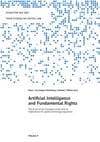⚡ Quick Summary
This 2020 report by the EU Agency for Fundamental Rights (FRA) examines how AI systems deployed by public authorities in the EU impact fundamental rights. Focusing on real-life use cases in predictive policing, fraud detection, and welfare eligibility, it reveals challenges such as opaque decision-making, data biases, lack of oversight, and limited public understanding. Drawing on interviews and case studies across five EU Member States, the report provides concrete, human rights-centered recommendations. It’s a foundational reference for policymakers, legal scholars, and governance practitioners aiming to align AI deployment with EU fundamental rights.
🧩 What’s Covered
The report investigates AI use by public bodies in five Member States—Estonia, Finland, France, the Netherlands, and Spain—through three application areas:
- Predictive Policing – Systems used to anticipate crimes or identify individuals at risk. Examples include predictive analytics tools for burglary hotspots or gang violence.
- Fraud Detection – AI to flag potentially fraudulent claims in tax and welfare systems.
- Welfare Eligibility – Automated decision-making in assessing entitlement to welfare benefits.
Key findings include:
- Lack of Transparency: Officials often struggle to explain AI-based decisions to the public, especially when algorithms are proprietary.
- Data Bias Risks: The use of historical data may replicate or exacerbate social biases, particularly against minorities.
- Weak Legal Safeguards: Fundamental rights impact assessments are rare, and few mechanisms exist for individuals to challenge algorithmic decisions.
- Oversight Gaps: Independent audits and algorithm registers are largely absent or insufficiently developed.
- Public Trust Issues: Many individuals affected by these systems are unaware of their existence or do not understand their operation.
Each country case study includes local examples, regulatory context, and input from civil society, oversight bodies, and practitioners. The FRA also maps how current practices align with rights such as non-discrimination, privacy, access to justice, and good administration.
💡 Why it matters?
This report remains one of the most grounded and empirical explorations of how government use of AI can infringe on EU fundamental rights. It shifts the focus from abstract risks to concrete harms, especially for marginalized groups. As the EU AI Act enters into force, these findings directly support the implementation of risk-based approaches, the development of transparency and redress mechanisms, and the need for stronger accountability frameworks for public sector AI. It’s especially valuable for cities, agencies, and legal actors aiming to operationalize rights-based AI governance at the local level.
❓ What’s Missing
- The report predates the final EU AI Act, so it doesn’t explore how new legal obligations (e.g. fundamental rights impact assessments, conformity assessments) might change the landscape.
- Technical aspects of AI systems (e.g. model architectures, explainability methods) are not covered in depth.
- Private sector use of AI, even when it indirectly affects fundamental rights (e.g. through outsourcing), is largely excluded.
- Limited longitudinal data on outcomes—e.g. how individuals affected by algorithmic decisions ultimately fared.
👥 Best For
- EU policymakers and regulators implementing the AI Act
- National and local public authorities deploying AI
- Legal practitioners focused on fundamental rights
- Civil society groups advocating algorithmic accountability
- Researchers in AI ethics, law, and social impact
📄 Source Details
Title: Getting the future right – Artificial Intelligence and Fundamental Rights
Publisher: European Union Agency for Fundamental Rights (FRA)
Year: 2020
Authors: FRA multidisciplinary team (no individual attribution)
Pages: 94
Link: fra.europa.eu
📝 Thanks to
FRA team for making this landmark report accessible and grounded in real-world contexts.


